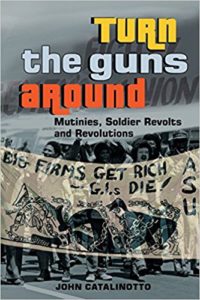
By Gregory William
World View Forum has published a new book by John Catalinotto, a long-time anti-war activist and working class revolutionary. In the late 60s and early 70s, Catalinotto was an organizer of the American Servicemen’s Union, or ASU.
The ASU was an important organization in the struggle against the U.S. imperialist war in Vietnam. The union brought together rank and file soldiers on the basis of class, helping to intensify mass resistance to the military brass who were carrying out the directives of U.S. capitalists—the capitalists being the enemy of both the U.S. soldiers and the Vietnamese people.
Catalinotto brings together excerpts from period documents (many letters from G.I.s stationed in Vietnam and around the world, sent to ASU headquarters) with his newer analysis of these events. The book can be read as an exciting panorama of the 60s and 70s, told from the heart of the anti-war movement. It also details how this resistance did not develop in isolation, but rather in conjunction with the Black Power, Chicano, women’s, and other movements of the time.
Additionally, Catalinotto analyzes many other revolutionary situations in their military aspect, for example the Paris Commune, which in 1871, was the rst instance of modern working class revolution. They were successful (however briefly) because, at a pivotal moment, soldiers broke the chain of command and refused to fire on the armed workers—hence the title of the book, “Turn the Guns Around.” This was the case in the Russian revolution. He also demonstrates that the rebellion in the military even facilitated the U.S. defeat in Vietnam.
Countless soldiers deserted or went AWOL, the highest rates in modern history. And from 1969-1972, there were 900 documented incidents of U.S. troops killing their officers or sergeants.
The author has an overarching argument that he builds up with all these examples. He agrees with Karl Marx who concluded that workers must carry out armed resistance in order to break the power of the capitalist (or bourgeois) state; otherwise any resistance will be smashed by the capitalists who control repressive institutions such as the police. And in one revolutionary episode after another, rebelling soldiers, breaking the chain of command and joining workers in revolt, have played a decisive role.
